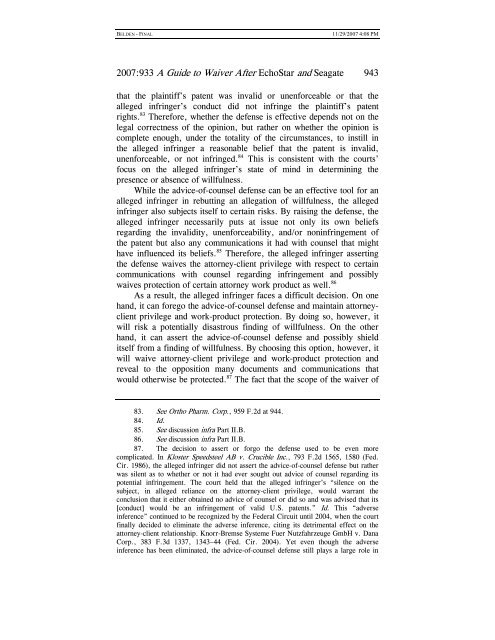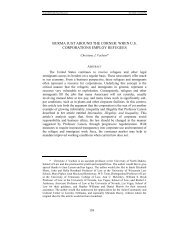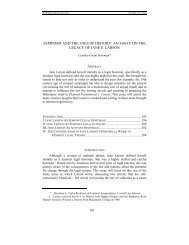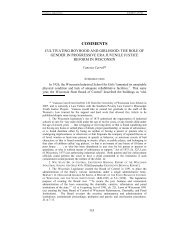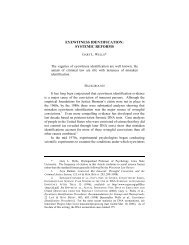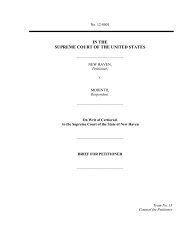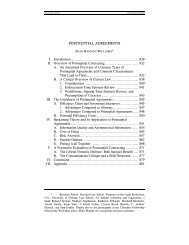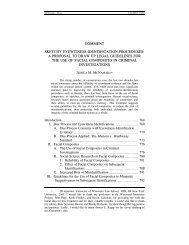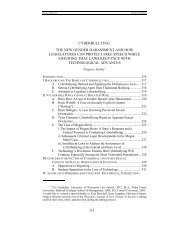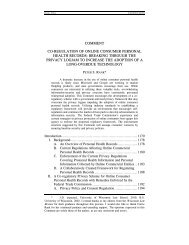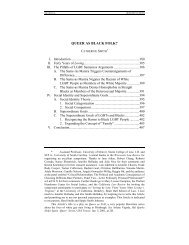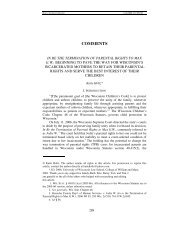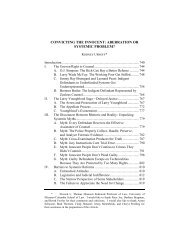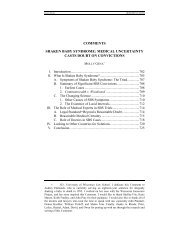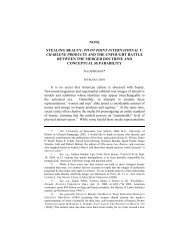note a guide to waiver after echostar and seagate - UW Law School
note a guide to waiver after echostar and seagate - UW Law School
note a guide to waiver after echostar and seagate - UW Law School
Create successful ePaper yourself
Turn your PDF publications into a flip-book with our unique Google optimized e-Paper software.
BELDEN - FINAL 11/29/2007 4:08 PM<br />
2007:933 A Guide <strong>to</strong> Waiver After EchoStar <strong>and</strong> Seagate 943<br />
that the plaintiff’s patent was invalid or unenforceable or that the<br />
alleged infringer’s conduct did not infringe the plaintiff’s patent<br />
rights. 83 Therefore, whether the defense is effective depends not on the<br />
legal correctness of the opinion, but rather on whether the opinion is<br />
complete enough, under the <strong>to</strong>tality of the circumstances, <strong>to</strong> instill in<br />
the alleged infringer a reasonable belief that the patent is invalid,<br />
unenforceable, or not infringed. 84 This is consistent with the courts’<br />
focus on the alleged infringer’s state of mind in determining the<br />
presence or absence of willfulness.<br />
While the advice-of-counsel defense can be an effective <strong>to</strong>ol for an<br />
alleged infringer in rebutting an allegation of willfulness, the alleged<br />
infringer also subjects itself <strong>to</strong> certain risks. By raising the defense, the<br />
alleged infringer necessarily puts at issue not only its own beliefs<br />
regarding the invalidity, unenforceability, <strong>and</strong>/or noninfringement of<br />
the patent but also any communications it had with counsel that might<br />
have influenced its beliefs. 85 Therefore, the alleged infringer asserting<br />
the defense waives the at<strong>to</strong>rney-client privilege with respect <strong>to</strong> certain<br />
communications with counsel regarding infringement <strong>and</strong> possibly<br />
waives protection of certain at<strong>to</strong>rney work product as well. 86<br />
As a result, the alleged infringer faces a difficult decision. On one<br />
h<strong>and</strong>, it can forego the advice-of-counsel defense <strong>and</strong> maintain at<strong>to</strong>rneyclient<br />
privilege <strong>and</strong> work-product protection. By doing so, however, it<br />
will risk a potentially disastrous finding of willfulness. On the other<br />
h<strong>and</strong>, it can assert the advice-of-counsel defense <strong>and</strong> possibly shield<br />
itself from a finding of willfulness. By choosing this option, however, it<br />
will waive at<strong>to</strong>rney-client privilege <strong>and</strong> work-product protection <strong>and</strong><br />
reveal <strong>to</strong> the opposition many documents <strong>and</strong> communications that<br />
would otherwise be protected. 87 The fact that the scope of the <strong>waiver</strong> of<br />
83. See Ortho Pharm. Corp., 959 F.2d at 944.<br />
84. Id.<br />
85. See discussion infra Part II.B.<br />
86. See discussion infra Part II.B.<br />
87. The decision <strong>to</strong> assert or forgo the defense used <strong>to</strong> be even more<br />
complicated. In Kloster Speedsteel AB v. Crucible Inc., 793 F.2d 1565, 1580 (Fed.<br />
Cir. 1986), the alleged infringer did not assert the advice-of-counsel defense but rather<br />
was silent as <strong>to</strong> whether or not it had ever sought out advice of counsel regarding its<br />
potential infringement. The court held that the alleged infringer’s “silence on the<br />
subject, in alleged reliance on the at<strong>to</strong>rney-client privilege, would warrant the<br />
conclusion that it either obtained no advice of counsel or did so <strong>and</strong> was advised that its<br />
[conduct] would be an infringement of valid U.S. patents.” Id. This “adverse<br />
inference” continued <strong>to</strong> be recognized by the Federal Circuit until 2004, when the court<br />
finally decided <strong>to</strong> eliminate the adverse inference, citing its detrimental effect on the<br />
at<strong>to</strong>rney-client relationship. Knorr-Bremse Systeme Fuer Nutzfahrzeuge GmbH v. Dana<br />
Corp., 383 F.3d 1337, 1343–44 (Fed. Cir. 2004). Yet even though the adverse<br />
inference has been eliminated, the advice-of-counsel defense still plays a large role in


